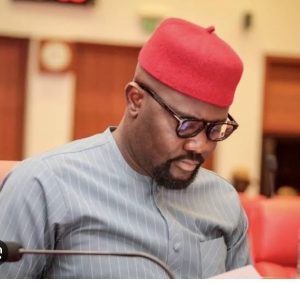Sen Osita Ngwu Makes case about Dwindling Solid Mineral Revenue

The Senator representing Enugu West has urged the Federal government to investigate the activities around the mining industries.
Making a case on the floor of the senate, Sen Ngwu, in his motion titled: Comprehensively Review the Input and Output Values of the Nigerian Mining Industry in Light of its Central Role to Economic Diversification, Foreign Exchange Earnings and Social Inclusion, pointed out that the contribution of the mining sector to Nigeria’s GDP is less than should be.
Speaking extensively, he noted that virtually all economic development programmes and fiscal documents, ranging from the Vision 20-20-20 Report, the National Economic Empowerment Development Strategy, NEEDS, the 30-year Infrastructure Master Plan Development Programme and the current Mid-Term National Development Plans, MIND (2021-2025/2026-2030) all identified the Nigerian Mining sector as central to economic diversification and social inclusion.
“After several decades of policy incoherence and weak institutional dis-alignment, the economic potential of the sector to the gross domestic product, GDP of the economy has remained dismal;
“While quarrying dominates the total output of mining sector with almost 90% contribution and an increasing growth rate that is largely driven by products such as granite, gravel, marble and other
construction materials in high demand within the Housing sector, the requisite benefits to the government are not significantly evident by way of royalties;
“The Nigeria Extractive Industries Transparency Initiative NEITI Solid Mineral Industry Report, 2020 indicates that the five year trend of Solid Minerals Contribution to GDP from 2016 to 2020 has been inconsistent and fluctuating, while Nigeria gets less from the Sector, about 0.45% in 2020, other African countries enjoy significant contribution from the sector to their GDP. For example, the sector contributes over 40% to the GDP of Botswana; and in Congo and South Africa, it is about 25% and 18% respectively.
“The Bureau of Public Enterprises, BPE has been selling and is on the verge of concluding the privatization and commercialization of all public funded facilities relating to the Nigerian Mining and mineral sector, in spite of the fact that none of its privatization programs has shown any concise beneficial impact to the mining industry as it had severally pronounced;
“Despite the abundant mineral endowment of the country, their critical national importance and huge resources so far expended by government, the contribution of the mineral sector to job creation, infrastructure development and the GDP of the economy remains one of the lowest across the African sub-Saharan region, he said.
Accordingly the Senate Resolved to Mandate its Committee on Solid Minerals Development to:
1. Investigate the immediate and remote causes of the dwindling revenue derivable from solid minerals development in the country;
2. Review the activities of the policy administrators, the policy executors, and the industry
players at the policy formulation, policy execution, and the downstream, midstream, and
upstream operations of the solid minerals sector;
3. Ascertain the extent and impact of illegal mining activities and the extent of complicity of both local and expatriate industry players;
4. Review all the BE privatization or commercialization programs of all mining and mineral resources related programs from 1999- date.
5. Additionally, that the Senate should mandate BPE to stop further sales of all mining assets and minerals pending the investigation of the committee on Solid Minerals Development.
6. Urge the relevant security agencies to strengthen surveillance on solid mineral resources to avoid further theft.
